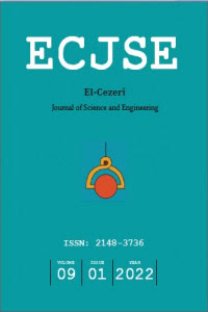Nondestructive Testing of Welded Test Setup Construction By Vibrational Behaviour
Nondestructive Testing of Welded Test Setup Construction By Vibrational Behaviour
___
- [1] Sinha, J.K., 2002: Health Monitoring Techniques for Rotating Machinery, Ph.D. Thesis, University of Wales Swansea (Swansea University), Swansea, UK. [2] Al-Hussain K.K., 2003: Dynamic stability of two rigid rotors connected by a flexible coupling with angular misalignment. Journal of Sound and Vibration, 217-234. [3] Sudhar, G.N.D.S., Sekhar, A.S., 2011: Identification of unbalance in rotor bearing system. Journal of Sound and Vibration, 330, 2299-2313 [4] Lebold, M., Reichard, K., Boylan, D., 2003: Using DCOM in an open system architecture framework for machinery monitoring and diagnostics. IEEE Aerospace Conference,1227–1235. [5] Christer, A.H., Wang, W., Sharp, J.M., 1997: A state space condition monitoring model for furnace erosion prediction and replacement. European Journal of Operational Research, 101, 1 –14. [6] Goodenow, T., Hardman, W., Karchnak, M., 2000: Acoustic emissions in Broadband vibration as an indicator of bearing stress, in: IEEE Aerospace Conference Proceedings, 6, 95–122. [7] Schoen, R.R., Lin, B.K., Habetler, T.G., Schlag, J.H., Farag, S., 1995: An unsupervised, on-line system for induction motor fault detection using stator current monitoring. IEEE Transactions on Industry Applications, 31(6), 1280–1286.
- ISSN: 2148-3736
- Yayın Aralığı: Yılda 3 Sayı
- Başlangıç: 2013
- Yayıncı: Tüm Bilim İnsanları ve Akademisyenler Derneği
Ahmet Alper Tunga OKUYAN, Hüseyin UZUN
Examination of High School Teachers’ Radon Awareness in Terms of Some Variables
Tolga MERT, Kutsi Mert ŞENÖZ, Levent BİLGİLİ, Uğur Buğra ÇELEBİ, Serkan EKİNCİ
Sürtünmeli Delik Delme Prosesi ve Prosesin Başlıca Uygulamaları
Mehmet Yasin DEMİREL, İbrahim KARAAĞAÇ
Direnç ve Sürtünme Karıştırma Nokta Kaynağı ile Birleştirilen Alüminyum Levhaların Karşılaştırılması
Duygu BODUR, Cevat OĞUZCAN, Sefa ERTÜRK, Yahya BOZKURT
Fırat DURMUŞ, Mürsel EKREM, Gürol ÖNAL
Hüdayim BAŞAK, Yusuf KAYIR, Esra Hilal TÜRKYILMAZ
İzoniazid Çözeltisinde Üç Değerlikli Kromun İndirgemesinin Elektrokimyasal Mekanizması
Kompozit Panellerde CTP Levha Ve Çekirdek Kalınlığının Mekanik Özelliklere Etkisi
